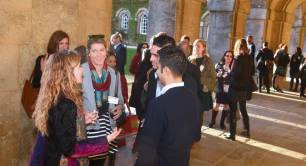Skoll World Forum sees new threat: fake news
Historically concerned with global challenges such as poverty and inequality, conversation at the Skoll World Forum was dominated by a new subject this year. The first forum following the election of President Trump and Brexit saw much disquiet about civil discourse in the social media age.
The first full day of the forum, which brings together around 1,000 social entrepreneurs in Oxford, started with the Omidyar Network announcing it would invest $100m to address “the global trust deficit”.
Over the next three years the money will be invested in “strengthening independent media and investigative journalism, tackling misinformation and hate speech, and enabling citizens to better engage with government on critical issues”.
We must protect the principles of openness, participation, and accountability
Omidyar Network managing partner Matt Bannick pulled no punches describing the motivation for the investment.
“A lack of government responsiveness and a growing distrust in institutions, especially the media, are eroding trust," he said. "Increasingly, facts are being devalued, misinformation spread, accountability ignored, and channels that give citizens a voice withdrawn.
“These trends cannot become the norm, and we must protect the principles of openness, participation, and accountability. These are the foundations of a healthy democratic society.”
With information freely available online and ad blockers strangling funding sources for journalism, there was much scratching of heads about how to maintain independent objective voices.
What we're trying to do is catch the next generation now before they give up on media because they're really close to deciding it's not worth it
Charles M Sennott of The Ground Truth charity, a news organisation covering social issues, said the organisation had considerd how it could fund journalism training for young people and that the stakes were high.
"What we're trying to do is catch the next generation now before they give up on media, because they're really close to deciding it's not worth it, there's no future in it and there's no money in it," he said.
The idea that journalism should be subsidised in the same way that art and theatre is was mooted. Fred de Sam Lazaro, an international correspondent for America's Public Broadcasting Service (PBS) said that he was sponsored by Minnesota University. He said: "We're bringing material that we produce for PBS into the classroom... and that is an under-utilised resource for all of academia."
Fake news
The problem of fake news was explored in a later session. Philip Howard (pictured second from left above), professor of sociology, information and international affairs at the Oxford Internet Institute, said his organisation had found evidence of its influence.
“We think that bots had a role in the US election, 16 months ago, to make Trump seem more popular than he really was. We know the automation was behind the stories about [Hillary] Clinton in the last week of the election. They made stories about Hillary Clinton’s corruption stay in our feed even after the FBI made it known they had found nothing untoward.”
The size of the Omidyar investment was welcomed, although it was put into context by Eli Pariser (pictured, speaking, above) of Upworthy, a media organisation that publishes stories intending to bring people together.
He pointed out that a primetime show anchored by political commentator Bill O’Reilly made Fox news $178m in ad revenue in one year. "And that’s just one show on one cable channel,” Pariser said.
Howard also questioned whether philanthropic orgnisations should be policing information on the social media platform. He said: “Why should Omidyar be paying for fact checking on Facebook?” According to Forbes magazine, Facebook founder Mark Zuckerberg's net worth is $55.9bn.
The Skoll World Forum continues until Friday – follow Pioneers Post on Twitter, online and on Facebook, plus #skollwf for more.



